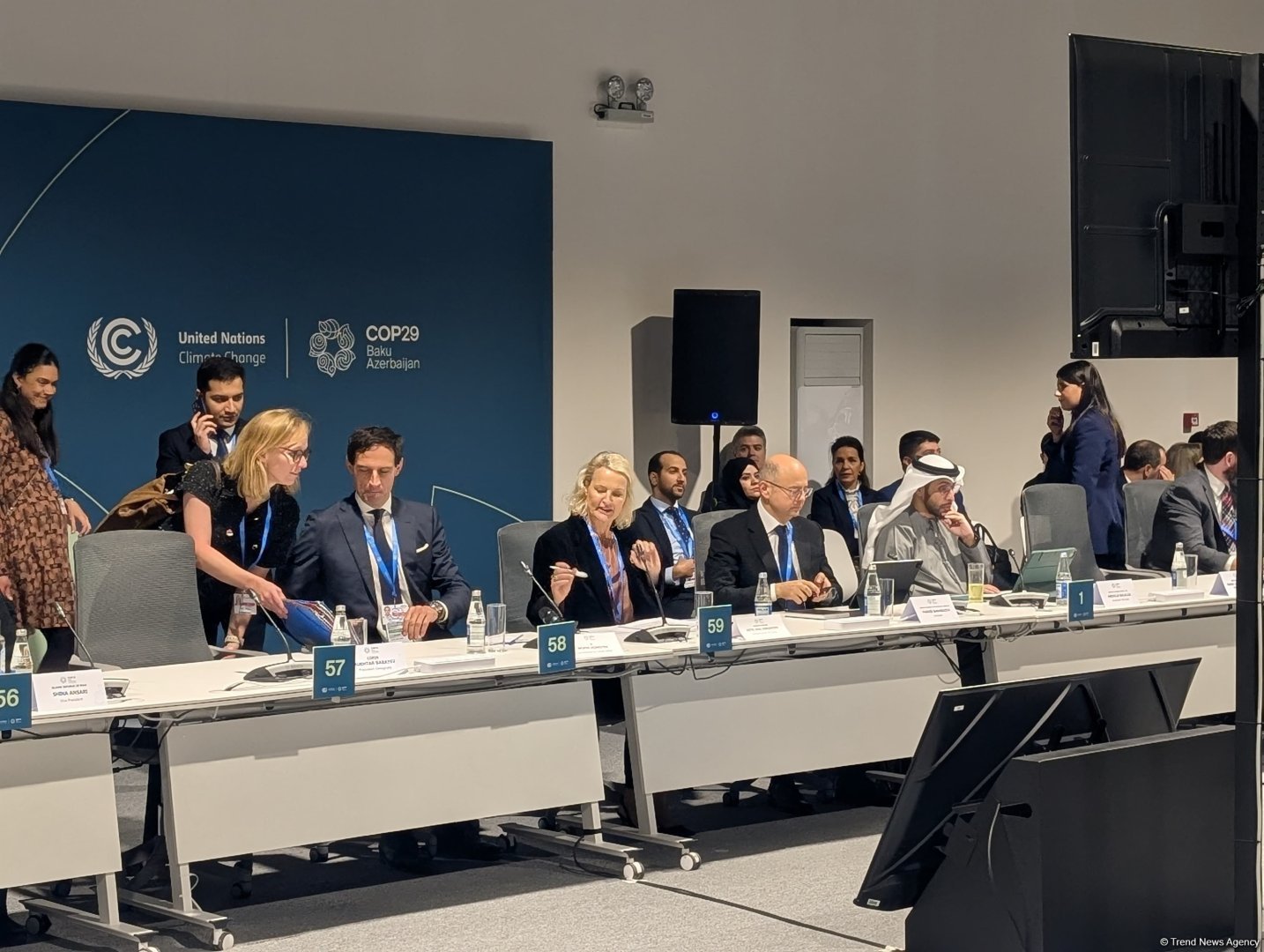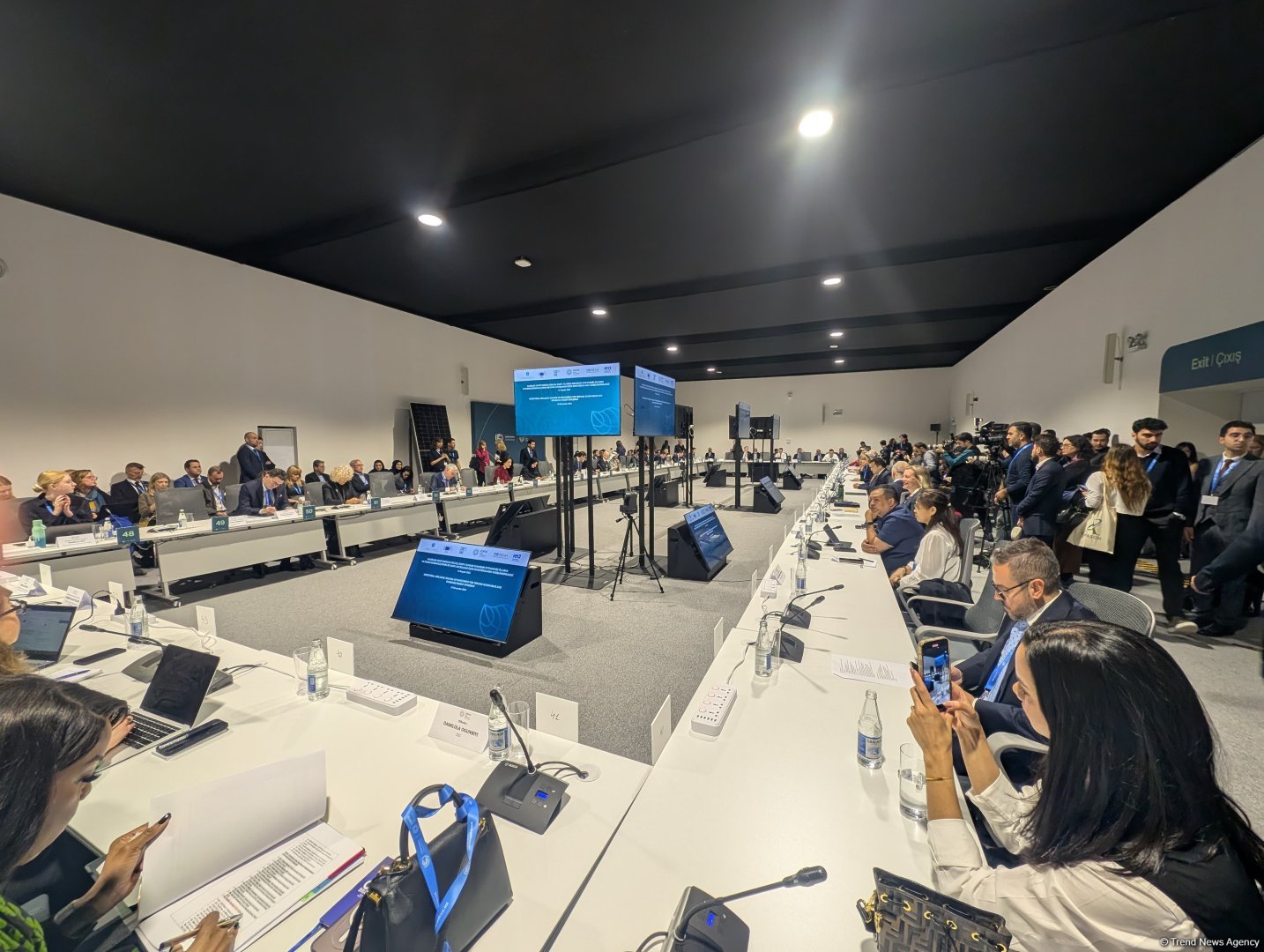BAKU, Azerbaijan, November 12. A ministerial dialogue on "Scaling Investments to Triple Renewable Energy and Double Energy Efficiency" is taking place as part of COP29 in Baku, Trend reports.
Azerbaijan's Minister of Energy said that COP29 stands as a new driver for global efforts to accelerate these commitments and progress.
"COP29 is a global event that marks an important milestone on our path to ambitious goals — tripling renewable energy and doubling energy efficiency. Through the Global Commitment on Renewable Energy and Energy Efficiency, our partnership with the European Commission, COP28, the International Energy Agency (IEA), and IRENA (International Renewable Energy Agency) reflects our unwavering commitment to advancing and supporting green energy, contributing to international efforts for a brighter and more efficient future.
Almost a year ago, at COP28, the vast majority of the world's countries made a collective commitment to renewable energy and energy efficiency, which are fundamental elements of the energy transition by 2030. This pivotal moment became a turning point in the fight against climate change, aimed at limiting global warming to 1.5 degrees.
COP29 is now a driving force behind global efforts to accelerate the implementation of these commitments and progress, focusing on removing barriers to a rapid energy transition," Shahbazov added.
Besides he added that Azerbaijan renewed the target for the share of renewable energy sources by 2030 to 35.5 percent.
"A 200-megawatt solar power plant in the green energy zone in Eastern Zangezur will play a significant role in supporting the decarbonization of the oil and gas sector in Azerbaijan as a whole. Overall, solar and wind power plants with a total capacity of 2,250 megawatts, which are planned to be commissioned by 2030, will increase the share of renewable energy in installed capacity to 35.5 percent.
This not only updates our target to 30 percent but also represents more than a sevenfold increase in the share of solar and wind energy in our energy system," added Shahbazov.
EU Climate Action Commissioner Wopke Hoekstra said that we must act swiftly to transform our clean energy goals into tangible results.
"Last year in Dubai, we made significant strides in our commitment to a sustainable future. We acknowledged the urgent need to transition away from fossil fuels, making a bold pledge to triple our renewable energy capacity and double our energy efficiency by 2030. This commitment is not just a target for the future; I believe it represents the most prudent investment we can make today.
Renewable energy is a homegrown solution that generates jobs, enhances our energy independence, and, notably, is already more cost-effective than traditional, polluting alternatives. By reaching these ambitious goals, we have the potential to reduce global greenhouse gas emissions by an astounding 10 billion tonnes by the end of this decade. To put this into perspective, that’s more emissions than the entire European Union produces in three years. This vision is bold, yet I firmly believe that it is within our grasp," Hoekstra said.
He noted that Europe experienced an 8 percent reduction in emissions last year, driven by the swift growth of renewable energy sources.
"Today, over half of Europe's electricity is generated from wind and solar sources, outpacing the combined output of all fossil fuels. However, on a global scale, emissions rose by 1.3 percent last year, highlighting the magnitude of our shared challenge. We must accelerate our efforts and transform our clean energy targets into tangible projects across every continent and within each of our economies," the European Commissioner said.
Then he added that three key areas can achieve significant results in climate action.
"Let’s start with power grids. Tripling renewable energy and global electrification require significant infrastructure improvements. The International Energy Agency predicts that by the end of the decade, 25 million kilometers of new and upgraded power lines will be needed.
Europe is investing in this through the 'Global Gateways' strategy, with 300 billion euro allocated to fund projects around the world — from modernizing infrastructure in Nepal to building new high-voltage lines between Ecuador and Peru. This is just part of our global reach," noted Hoekstra.
The second focus is critical minerals, he explained.
"Clean technologies require sustainable and reliable sources of minerals — such as lithium, cobalt, and rare-earth elements, which are essential for batteries, turbines, and solar panels. Global demand for these minerals is expected to triple by 2030, and the demand for lithium could increase 40-fold by 2040.
The extraction and processing of these resources must be sustainable and benefit local communities. Europe, as co-chair of the UN Critical Minerals Panel, is committed to high standards for supply chains and has already received 170 proposals from around the world for mining, processing, and recycling projects. This creates real opportunities for producing countries," he added.
He mentioned investment as the third focus.
"Renewable energy, grids, and minerals all require significant investment. Europe remains the largest source of climate finance, allocating $31 billion per year. However, public funding alone is not enough. It is crucial to engage the private sector to meet the needs of the clean energy transition.
Today, 760 million people still lack access to electricity, especially in sub-Saharan Africa, which has immense clean energy potential. Our job is to support them by lowering the cost of capital to ensure access to clean energy worldwide. At the G20 Leaders’ Summit, European Commission President Ursula von der Leyen will present a new initiative alongside South Africa and Global Citizen," emphasized the commissioner.
"Tripling renewable energy and doubling energy efficiency are ambitious but achievable goals. They will reduce reliance on fossil fuels and bring us closer to net zero. Our main task is to manage this transition wisely, so that everyone can benefit from clean energy. The EU is ready to support this," concluded Hoekstra.










